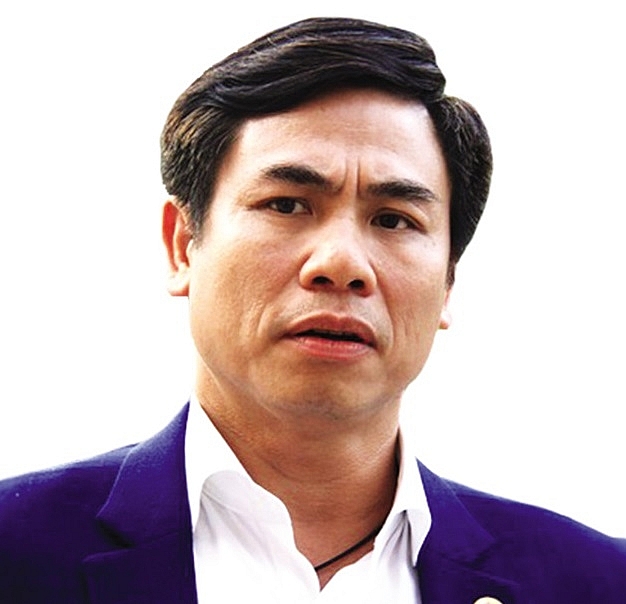
In 2017, the image of Cocobay Danang overwhelmed the country’s media with Cristiano Ronaldo as the face of the venture and “Cocobay – My home in Vietnam” as its slogan.
That year, the condotel project was also presented to an international stage when Danang hosted the major APEC event, featuring participation of more than 12,000 representatives from 21 member economies. And just last year, Cocobay and Empire Group hosted the first phase of Miss Vietnam 2018, with the image of the venture spread far and wide.
Thanks to many large-scale advertisements. Cocobay attracted buyers in quick fashion. However, the true progress of Cocobay was revealed only recently, when its Achilles’s heel was discovered.
A nightmare investment
Buyers who have purchased condotel units at the Cocobay complex faced a shock when Thanh Do Investment Development and Construction JSC (Empire Group), the developer of the project, announced that it could not keep its commitment of paying annual returns and would stop paying yields from December 1, 2020.
Nguyen Thuy Duyen, a Hanoian who bought a Cocobay unit at a price of VND1.5 billion ($63,800), told VIR that she had sued for the annual return from the unit for the last year.
“I am very worried because when buying this unit I had to get a loan from the bank and paid interest for five years. Now, Empire Group cut the yield suddenly and I do not have any other financial sources to pay this,” Duyen said.
Nguyen Hai Long, a representative of 700 owners of Cocobay, was also shocked by the announcement from Empire Group.
Talking with local media, Long said he bought a semi-detached house in Cocobay with insurance from a local bank. “I, and many other owners, trusted the Empire Group and the bank behind it; however, now this incident happened and has put a lot of pressure on us,” Long said
Annual returns from the developer are paid directly to banks as periodic loan repayments under standard three-way agreements, signed when an investor purchases a property. Because Empire Group has decided to step back, banks are asking investors for these sums, Long added.
VIR was told that the yield was due to be paid out every six months, in June and December. However, many owners failed to receive the June yield from this year.
On November 28, many of the buyers stood in front of the Empire Group office located in Hanoi, expressing their anger about the company’s refusal to pay the annual returns to them.
“We don’t agree with the options which Empire Group suggested to us. They are like traps and it is very difficult for us to choose any of them,” said Duyen, a homebuyer from Hanoi.
Another said, “I came here with many other buyers who have invested in a condotel in Cocobay Danang. We all disagree with Empire Group’s one-sided decision. They have committed to this agreement and must keep it.”
Future in doubt
Experts and developers have different opinions on whether the condotel model is going to be successful.
Despite not commenting on any specific condotel case, Troy Griffiths, deputy general director of Savills Vietnam, expects no market crisis from this. “It’s happened all over the world before and is a good learning example. There will certainly be more failures as the operating assets cannot meet the guaranteed returns, and without experienced developers, the premium gets spent elsewhere,” he said
The most common method in solving such an incident, according to Griffiths, is to issue a prospectus for the investment that has audited financial statements linked to guaranteed capital that can service the distributions.
“In many markets such as Singapore, Hong Kong, and Australia, it is mandatory to ensure the developer complies and purchasers are protected,” he added.
Pham Lam, general director of DKRA Vietnam said that even though the Cocobay incident should not represent the whole market of tens of thousands of condotels, buyers will still try to find safer investment opportunities.
“There are many factors that lead to an investment decision, so I don’t think that there is any specific way to approach the whole market,” said Lam. “However, I am sure investors will soon become more hesitant towards the condotel segment. In the long term, however, the condotel sector will be more regulated by laws and be better operated.”
Meanwhile Doan Van Binh, chairman of CEO Group, one of the biggest condotel and tourism developers, believed that the Cocobay incident was a unique case.
“Condotels are good business if the developer strictly follows the regulations and the movements of the market. Condotels have had a positive impact on the Vietnam real estate market in recent years. They have contributed to the development of the market with thousands of condotel units launched, and many of those sold successfully,” Binh said.
He does believe that if the condotel sector is developed in a sensible manner, it represents a key channel to attract investment capital from both domestic and international investors.
Agreeing with Binh, Nguyen Tran Nam, chairman of the Vietnam Real Estate Association confirmed that condotels are good business products. However, with the Cocobay incident, the developer had chosen the wrong venue for the project, far away from the center, and expected too high a yield.
“The current 8-12 per cent yield which Cocobay has committed to is too high compared to bank interest, so it contains much more risk,” said Nam.
He added that the risk is lessened because the Cocobay properties remain there and its value could still increase during the time, as only the annual return is reduced.
“This is nothing compared to other risks in the real estate market which homebuyers may become burdened with,” Nam said.
Nam was in total agreement with the three options Cocobay presented to the buyers. “I think those options are reasonable and could be further negotiated between the developers and the buyers, to find a feasible solution,” he added.
Developer reflections
Nguyen Duc Thanh, chairman of Empire Group cited financial difficulties as the reason for breaking the commitment of annual returns to the buyers.
Due to the lack of a legal framework, the venture failed to progress in the last two years, forcing the bank behind the project to freeze capital. This led to a state of limbo for the entire project.
Despite having signed operation contracts with two famous groups – StayWell Holdings and the Louvre Hotels Group – progress on the project remains slow due to design and concept revisions. Therefore Thanh said he could not provide an annual return of 12 per cent per year.
According to Thanh, the company had offered buyers several outs upon announcing that it would stop the promised annuities payments.
For instance, the buyer can continue to be a partner with Cocobay and receive a fixed return or sharing return based on the real business result, the buyer can receive their units and self-leasing to benefit or sell it to other secondary buyers, and they can sell units back to the developer.
Among the options, investors can sell back flats and get a full refund. Thanh cited that with this option, there will be "no loss and no damage.”
However, this solution does not account for time spent and additional fees, such as financing, management, and operational costs of getting involved in the project.
In its financial report, Empire Group released that it has been reporting losses since 2017, accumulating VND134 billion ($5.7 million) as of last year.
Nguyen Manh Khoi - Deputy director general, Housing and Real Estate Market Management Agency

Recently in this country, numerous investors and homebuyers have faced several issues with the Cocobay condotel project in the central city of Danang, caused by the lack of definition of a condotel.
There are three main problems with this real estate model that we should find solutions or definitions for.
The first is land use regime, the second is the regulations on recognition of ownership, and the third involves how to manage and operate this model. Besides that, we are considering the agreements on benefits and commitments between developers and clients.
As a state management authority, the Ministry of Construction has specified obstacles of condotel management to report to the government and prime minister. Since then, the prime minister has assigned several tasks to three ministries - of these, the Ministry of Construction will have to provide certain standards for condotels and officetels, and the ministry is formulating and going to issue the standards in the time coming.
Nguyen Ngoc Thanh - Vice chairman, VNREA

Commitments of profit entails the civil relationship between both buyers and sellers to share the benefits, which is a popular solution in any real estate transaction in order to mobilize social capital.
If a risk becomes reality in this area, the commitments are not to be carried out. The Criminal Code stipulates the provisions to apply in this case, clarifying the responsibilities of each party.
In my opinion, the party that contravenes the clauses in the contract will have to compensate the remaining parties involved, and the rights of homebuyers should be prioritized and protected.
Legal provisions for condotels have yet to be perfected, so every condotel project on the market has been operated in its own way, without a general legal framework. Therefore, clients and homebuyers should be careful to invest into this segment in order to minimize risks.
Particularly, condotels depend much on the development of tourism, which is fluctuating constantly. If the number of tourists decreases, condotel investors will face a lot of trouble.
Ngo Huynh Phuong Thao - Lawyer, TAT Law Firm

Cocobay Danang is the first condotel project in which the developer broke the promise on commitment of profit noted on the contract. The core service of a condotel is a hotel or residence service for tourists only. So the first solution provided by Empire Group will hamper clients in the long term.
The next solution to transform the condotel into houses and apartments is quite absurd. Cocobay is a tourism accommodation project, which has been licensed by the local government, and its land has been already planned for commerce, services, and business.
Moreover, if it could transform into housing, homebuyers will have to pay an additional 15 per cent of purchase value for their own property, which has been already overcharged. That means clients have to pay twice for this investment, and suffer double the losses.
I guess that a lot of condotel projects could release similar announcements for homebuyers when developers cannot pay these huge profits for clients. After the honeymoon period, everything will show and operate in its real value and real nature.
Adam Bury - Executive vice president, Investment Sales Asia JLL Hotels

Whilst overall, we see great positive fundamentals and upcoming trends within the Vietnamese hospitality and tourism segment, condotel projects are something which we have been voicing concerns over for a number of years.
Unfortunately, it does therefore not surprise us that some of the developers are having cash flow issues with their planned projects.
We have seen “guaranteed returns” offered to investors which simply do not exist elsewhere in the region – we do not see 10 per cent return for 10 years or similar rates, in Thailand or Indonesia, which has now become the norm in Vietnam.
Elsewhere in the region, investors may see a guaranteed return for two or three years and not of 10 per cent.
By offering such returns, which we imagine are often on top of bank debts, developers have burdened themselves with liabilities which they simply cannot repay.
As operating businesses, condotels take much time to reach a stabilized cash flow - especially in resort destinations this may take at least three years, if not possibly more.
During such a ramp up period it is unlikely that a project would generate sufficient returns to cover these liabilities.
If the business model has not been sufficiently well planned or the product does not match what is required by the market, there is the possibility that cash flows may never meet the obligations.
It is definitely not fair to put all developers and projects in the same bucket, since there are certainly a number of successful projects within the market.
We strongly encourage feasibility study planning by developers coupled with increased caution by investors looking at buying projects of this category.


















